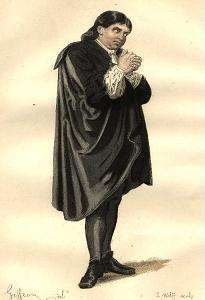Tartuffe

Tartuffe, ou, l'Imposteur is possibly the most famous play of Jean-Baptiste Poquelin, a.k.a. Moliere. Tartuffe is a con man who has the well-to-do Orgon convinced that he's a pious, generous, and all-around good guy. Everyone else (save for Orgon's mother) can see right through the ruse and try desperately to make Orgon see Tartuffe for the fraud he is -- especially when Orgon disinherits his son in Tartuffe's favor and attempts to make his daughter jilt her eligible suitor to marry the hypocrite. Worse yet, Orgon has admitted covering for a friend involved in a political plot -- and Tartuffe has no scruples about informing when this proves to be advantageous to him.
Published and performed in 1664, Tartuffe almost immediately drew the ire of some Catholic clerics (notably the Archbishop of Paris), who believed the play to be an attack against them (partly because, in the earliest performances, Tartuffe was costumed like a dévot, a member of the extreme Catholic party at court). They banned the play and threatened to excommunicate anyone who performed in or even saw it. In later versions, the author revised the character, to make him more secular. Fortunately for the dramatist, the King remained firm in his support, and he was able to avoid the threatened excommunication.
- Antagonist Title
- Arranged Marriage: Orgon tries to marry off his daughter Mariane to Tartuffe.
- Catch Phrase: In an early scene, when Dorine is describing how Tartuffe has been gorging and swilling while while Elmire had been suffering from a dangerous illness, Orgon's only response is a repeated, "The poor man!"
- Deadpan Snarker: Dorine, Mariane's handmaiden, has this trope in spades. Mariane isn't bad either.
- Deus Ex Machina: At the end of the play the King has Tartuffe sent to prison for numerous unspecified crimes
- Dirty Old Monk: Tartuffe is probably the Trope Codifier.
- Engineered Public Confession: Tartuffe reveals his true colors to Mariane, unaware that Orgon is listening.
- Grande Dame: Madame Pernelle, the Matriarch, is the only one besides Orgon who is taken in by Tartuffe's ruse. In the opening scene she complains that nobody pays attention to her.
- Hoist by His Own Petard: The documents Tartuffe reveals to the king contain proof to his real identity.
- Hot-Blooded: Damis
- Hypocrite: Not only Tartuffe, but his unseen man-servant as well; also Monsieur Loyal the bailiff.
- I Need to Go Iron My Dog
TARTUFFE: Sir, it is half-past three; certain devotions
Recall me to my closet; you'll forgive me
For leaving you so soon.
- Moral Guardian: Tartuffe acts like this in Orgon's house towards pretty much everything, from daily activities to fashion.
- Only Sane Man: Cléante, Orgon's brother-in-law, represents common sense. The argument could also be made that this trope is inverted, and Orgon is the Only Dumb Man.
- Reverse Psychology: When Damis catches Tartuffe trying to seduce his mother, he denounces the hypocrite to Orgon. Tartuffe turns the tables by declaring that, yes, he is a liar, a sinful man, a miserable deceiver -- which convinces Orgon that Damis has slandered his sinless, humble friend and causes the old man to turn his son out of the house.
- Rich in Livres Poor in Sense: Orgon. By the time he realizes Tartuffe is a fraud, he's given the man the deed to his estate.
- Take That: Against casuistry.